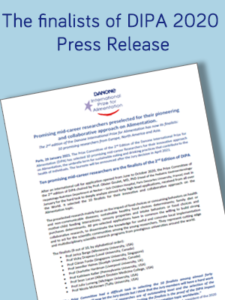The finalists of the 2nd Edition of DIPA, 2020
After an international call for application opened from June to October 2020, the Prize Committee of the 2nd edition of DIPA chaired by Prof. Olivier Goulet, MD, PhD (Necker – Sick Children Hospital, Paris Descartes University, France) met in January for the hard task to deeply analyze thirty four applications, received from all over the world. 10 finalists were preselected for their innovative and collaborative approach on the Alimentation topic.
Press release
Download the press release enclosed
The finalists of DIPA 2020 (by alphabetical order)
Jerica M. BERGE
 I am a new full professor with dual roles as a behavioral health clinician and researcher in the Department of Family Medicine and Community Health at the University of Minnesota, USA.
I am a new full professor with dual roles as a behavioral health clinician and researcher in the Department of Family Medicine and Community Health at the University of Minnesota, USA.
My work over the last 12 years has focused on alimentation across multidisciplinary sectors to address the numerous influences on people’s food choices and eating habits, with a strong focus on social determinants of health such as food insecurity. My approach to alimentation work combines three important elements: (1) integration across four key domains of research, clinical practice, community, and policy, (2) multidisciplinary collaborations, and (3) a health equity lens.
I applied to DIPA because I embrace their approach to alimentation work and I am particularly interested in moving my alimentation work to the international realm to promote cross-continental collaborations. I would be honored to be an ambassador for the DIPA.
Vicky DRAPEAU
 My research focuses on the impact of food and eating behaviors on appetite control, body weight, metabolic and overall health. Specifically, our work aims to characterize dietary practices (i.e., food choices and eating behaviors) that influence appetite control, body weight management, and overall health; and develop more efficient interventions, focusing on non-restrictive positive eating behaviors.
My research focuses on the impact of food and eating behaviors on appetite control, body weight, metabolic and overall health. Specifically, our work aims to characterize dietary practices (i.e., food choices and eating behaviors) that influence appetite control, body weight management, and overall health; and develop more efficient interventions, focusing on non-restrictive positive eating behaviors.
As the Co-director of the Clinique Équilibre-Santé at Université Laval in Quebec City, Canada, I also have expertise as a clinical dietitian with different populations (e.g., children, adults, athletes), which allows me to transfer our research knowledge into current practice.
Our work is linked with DIPA’s purpose since it aims to better understand diverse influences on eating habits and to better intervene by encouraging eating practices that contribute to individuals’ health through a multidisciplinary approach.
To take a step further in the field of alimentation, I applied to DIPA because it would contribute to improving our capacity to better intervene through an innovative and collaborative strategy that considers many individual and environmental determinants of food choices and eating behaviors in youth and their families and that would ultimately lead to sustainable healthy eating habits.”
Ciàran G. FORDE
 I am a Senior Principal Investigator in ‘Sensory Nutritional Science’ at the Clinical Nutrition Research Centre, and Associate Professor at the National University of Singapore.
I am a Senior Principal Investigator in ‘Sensory Nutritional Science’ at the Clinical Nutrition Research Centre, and Associate Professor at the National University of Singapore.
My research focuses on understanding how sensory properties can be used to influence choice and intake behaviors, and through this develop food-based strategies to improve diets and health.
I applied for the 2020 Danone International Prize for Alimentation as I believe my research is consistent with the concept of bringing health through food and the promotion of good nutrition through enhanced eating enjoyment and satisfaction.
Jess HAINES
 I am an Associate Professor of Applied Nutrition at the University of Guelph, Canada.
I am an Associate Professor of Applied Nutrition at the University of Guelph, Canada.
My research spans the entire knowledge-to-action cycle. I bridge cutting-edge epidemiologic and direct observational research on the predictors of sustainable healthy eating with the development of novel and scalable behavior change interventions and knowledge mobilization tools. My interdisciplinary approach has led to pioneering advances in our understanding of how best to support sustainable healthy eating among families.
I applied to DIPA because the award will allow my team to mobilize our research findings to effect real, lasting change that benefits the health of families and the planet.
Charlotte HARDMAN
 I am a Senior Lecturer in Psychology at the University of Liverpool, UK. My research examines the psychological, social and environmental determinants of eating behavior.
I am a Senior Lecturer in Psychology at the University of Liverpool, UK. My research examines the psychological, social and environmental determinants of eating behavior.
While changes to the overall food system are clearly needed, if we want consumers to make healthier and more sustainable food choices, it is essential to understand what drives dietary choices in different people. My research speaks directly to this issue and has wide-ranging implications for interventions that can lead to real-world impact.
I applied to the DIPA because I am passionate about the study of food choices and sustainable eating, and about communicating my research to as many different audiences as possible to facilitate impact and public benefit.
Kathleen L. KELLER
 I am the Director of the Children’s Eating Behavior Laboratory at the Pennsylvania State University, USA.
I am the Director of the Children’s Eating Behavior Laboratory at the Pennsylvania State University, USA.
Our research program is dedicated to improving food consumption and preventing chronic nutrition-related diseases among children. My research is investigating the neurobiological and environmental mechanisms of eating behavior in youth and applying this evidence to the development of sustainable and effective health interventions.
It seems for me that it is ideally suited for this prestigious award that is the Danone International Prize for Alimentation.
Sean C. LUCAN
 I am an Associate Professor in the Department of Family and Social Medicine at the Albert Einstein College of Medicine, Montefiore Health System, Bronx, NY, USA. The project I propose, “Linking Environments & Activity Paths” will be a “L.E.A.P.” forward in alimentation research. The project will examine neighborhood influences on food/drink purchases—specifically considering food/drink advertising and availability in the spaces where people go about their daily lives. The study will provide nuanced evidence on how ad/availability ‘exposures’ relate to individual demographics, dietary intake, and diet-related diseases.
I am an Associate Professor in the Department of Family and Social Medicine at the Albert Einstein College of Medicine, Montefiore Health System, Bronx, NY, USA. The project I propose, “Linking Environments & Activity Paths” will be a “L.E.A.P.” forward in alimentation research. The project will examine neighborhood influences on food/drink purchases—specifically considering food/drink advertising and availability in the spaces where people go about their daily lives. The study will provide nuanced evidence on how ad/availability ‘exposures’ relate to individual demographics, dietary intake, and diet-related diseases.
The DIPA award recognizes the kind of collaborative, multi-disciplinary, alimentation research to which I have devoted my career. I applied to DIPA because the prize is a prestigious international honor, providing opportunity to advance the global cause of cutting-edge alimentation science.
Julia C. LUMENG
 I am Professor of Pediatrics and Nutritional Sciences, at the University of Michigan, USA. For the past 17 years, I have conducted research on the mother-child feeding interaction. There is a long history in science of subtle but persistent bias such that the research focused on women and children – as well as research led by women – receives less scientific and public attention than research for and by other groups. This bias has the potential to adversely impact the lives of all women and children.
I am Professor of Pediatrics and Nutritional Sciences, at the University of Michigan, USA. For the past 17 years, I have conducted research on the mother-child feeding interaction. There is a long history in science of subtle but persistent bias such that the research focused on women and children – as well as research led by women – receives less scientific and public attention than research for and by other groups. This bias has the potential to adversely impact the lives of all women and children.
I applied for the DIPA with the goal of elevating research in this topic area in the service women’s and children’s health and wellbeing, as well as in support of the women conducting this research who will follow me in the years to come.
Nicola M. McKEOWN
 I am a mid-career scientist at the Jean Meyer USDA Human Nutrition Research Center on Aging at Tufts University (HNRCA) and an Associate Professor at the Friedman School of Nutrition Science and Policy at Tufts University located in Boston, MA, USA.
I am a mid-career scientist at the Jean Meyer USDA Human Nutrition Research Center on Aging at Tufts University (HNRCA) and an Associate Professor at the Friedman School of Nutrition Science and Policy at Tufts University located in Boston, MA, USA.
I am the principal investigator of the Adhering to Dietary Approaches for Personal Taste (ADAPT) Study. ADAPT captures a wealth of data on psychobiological, lifestyle, social, and environmental factors that influence dietary intake and adherence to particular diets. I applied to DIPA because its mission of boosting collaboration across the disciplines affecting nutrition perfectly aligns with the goal of our ADAPT Study!
The DIPA prize would provide my team and I with the support needed to study how lifestyle behaviors, socio-ecological factors, and the food environment influence free-living individuals’ abilities to adhere to healthier dietary patterns to promote optimal healthy aging.

